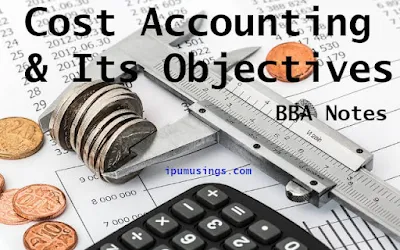Cost Accounting and Its Objectives - BBA-Semester-2 #CostAccounting #ipumusings #ggsipu #bbaNotes
Cost Accounting and Its Objectives
BBA-Semester-2
Question: What is cost accounting? What are the objectives of cost accounting?
Answer:
Cost Accounting is classifying, recording an appropriate allocation of expenditure for the
determination of the costs of products or services, and for the presentation of suitably arranged data for the purpose of control and guidance of management.
It is the formal mechanism by means of which cost of products or services are ascertained and
controlled.
Cost accounting involves the study and classification of expenditures in order to determine the overall cost of any given unit of product or service with a fair degree of accuracy while also disclosing how that total cost is calculated. For example, knowing that one pen costs ₹50 is insufficient; management wants to know the cost of the materials used, the quantity of labour, and other expenses incurred in order to regulate and lower the cost.
As a result, cost accounting is a quantitative process for gathering, classifying, summarising, and interpreting data for product costing, operations planning and control, and decision-making.
Objectives of Cost Accounting
The main goals or objectives of cost accounting are as follows:
✒ Determine the costs in various situations using various costing techniques and systems
✒ To determine the selling values in various situations
✒ Set standards for Materials, Labor, and Overheads to establish and control efficiency.
✒ To calculate the value of closing inventory in order to prepare the company's financial statements
✒ Determine the cost per unit of various products produced by a commercial enterprise;
✒ To provide an accurate cost analysis by process or operation, as well as by different cost aspects;
✒ To reveal sources of waste, whether in terms of material, time, or money, or in the usage of machinery, equipment, and tools, and to generate any reports that may be required to control such waste;
✒ To gather necessary information and serve as a guide for pricing products created or services delivered;
✒ To determine the profitability of each product and advise management on how to maximise earnings;
✒ To disclose sources of economy by installing and implementing a cost control system for materials, labour, and overheads;
✒ To exercise effective control over raw materials, work-in-progress, consumable stores, and finished goods in order to minimise the capital locked up in these stocks;
✒ To provide guidance to management on future expansion strategies and proposed capital projects;
✒ To present and analyse data for management planning, performance evaluation, and control;
✒ To assist in the formulation of budgets and budgetary control.
👉See Also:




